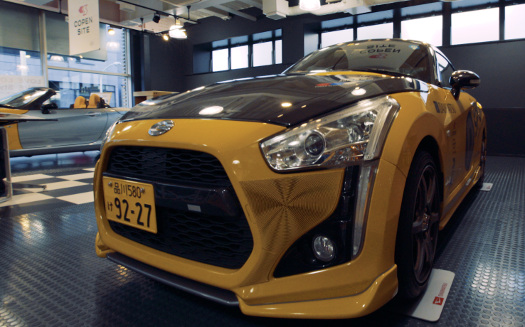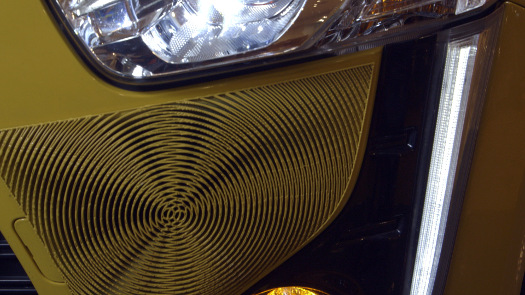 |
| June 28, 2016 | Volume 12 Issue 24 |
Designfax weekly eMagazine
Archives
Partners
Manufacturing Center
Product Spotlight
Modern Applications News
Metalworking Ideas For
Today's Job Shops
Tooling and Production
Strategies for large
metalworking plants
A world first: Stratasys 3D-printed parts used for mass customization of cars

Japanese automaker Daihatsu is offering customizable, 3D-printed exterior special effects panels for front and rear bumpers. Here the skin (with a geometric, moiré-like circle pattern) is shown applied to a Copen convertible.
Sometimes it's nice to have options.
Japanese car buyers looking for a little extra touch of personalization can find it in the form of customizable 3D-printed exterior effects offered from Daihatsu (Ikeda, Osaka, Japan) on their Copen two-door roadster.
Daihatsu partnered with 3D-printing solutions company Stratasys, Kota Nezu from industrial design company Znug Design, and 3D creator Sun Junjie to create 15 different "Effect Skins" that can be added on to the Copen car's front and rear bumpers and fenders.
The "skins" are intricate geometric and organic pattered plastic pieces in 10 different colors that are 3D printed using Stratasys Fortus 3D printers. Customers can adjust the parameters of the designs themselves before the panels are made, exponentially increasing the numbers of options and allowing "one-off" customization for each consumer.

Close-up of circle-patterned 3D-printed "Effect Skin."
The Effect Skins are 3D printed on Fortus Production 3D printers from Stratasys using ASA thermoplastic, a very durable and UV-resistant material that can produce high aesthetic appeal.
"What would have taken two to three months to develop can now be produced in two weeks," says Osamu Fujishita, general manager, Corporate Planning Department, Brand DNA Office, Daihatsu Motor Co. That two-week timeframe covers the time from consumer pattern selection/ordering to final-product delivery.
The traditional manufacturing method of reducing costs is mass production of identical parts to take advantage of economies of scale. But the Effect Skins project illustrates the growing power of 3D printing when it comes to creating on-demand product parts with high customizability and rich design properties.
"This project would not have been possible with traditional manufacturing or tooling methods," says designer Nezu.
"We believe on-demand production [with 3D printing] offers definite benefits to supply chain efficiencies," adds Fujishita. "And it allows easy access for customers."
In the last three years, 3D printing has expanded from prototyping to factory tooling to short-run production, with the expectation that it could also be used for mass customization of consumer products as the technology matured. The Daihatsu offering is one of the first to feature auto parts created specifically for this use.
With just a little imagination, it is easy to see how an offering like this can be expanded to include all kinds of extra interior and exterior add-ons to satisfy the growing customer demand for individualization.
The Effect Skin project is being tested in 2016 in select markets with plans for commercialization in early 2017.
Learn more about Stratasys Fortus 3D printers here.
Source: Stratasys
Published June 2016
Rate this article
View our terms of use and privacy policy
